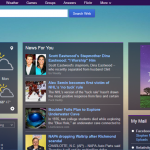Yahoo buys Android launcher Aviate

For many people, one of the great things about Android is the ability to customize. While iOS offers the ability to change your wallpaper, customization pretty much stops there. Google's mobile operating system is quite different, since it permits the installation of different launchers. If you aren't familiar, a launcher is essentially the UI. In other words, a user can change not only the look of their device, but how they interface with it too. Many manufacturers ship devices with their own launchers, rather than the stock variant. Luckily, if the consumer dislikes the one that comes with their Android device, they can download a different one such as Nova or Apex; two very popular launchers.
However a relatively new launcher has been taking the Android community by storm -- Aviate. Part of the allure of this launcher is that it is invite-only. However, once invited, the user can then invite five people. This allowed Aviate to spread virally; after all, people desire what they can't have. Apparently, Marissa Mayer did not want to wait for an invite. The Yahoo CEO had the company buy Aviate outright. Does this signal a future Yahoo smartphone?
Yahoo inadvertently spreads malware via ads

It seems not a day goes by when there isn't some sort of news about a security breach or malware. And lately, those have become more high profile -- Target not too long ago had customer information leaked and Snapchat just surrendered data, with the latter not even bothering to apologize to its customers.
Now a report from security researchers at Fox IT claims that Yahoo has been spreading malware through the ads served on the site. "Clients visiting yahoo.com received advertisements served by ads.yahoo.com. Some of the advertisements are malicious", the company notes.
Yahoo Mail experiencing issues since Monday!

On Monday, a number of Yahoo Mail users started experiencing issues when accessing the service. The company said, yesterday, a hardware problem in one of its mail data centers is the culprit and, as a result, it assigned "dozens of people", who are allegedly "working around the clock", to get Yahoo Mail back on track.
If you are wondering why it took Yahoo so long to acknowledge the problem then you are not alone. The company initially said at 11 AM PST on Wednesday that the full functionality of its email service will be restored "by 3 PM PT", on the same day. Half an hour after the first, and only, deadline Yahoo was still working "hard" to fix the problem.
Tech giants' surveillance reform rally is disingenuous and self-serving

I'll be brief, because I'm seven days now with the flu and don't feel much like writing. But today's "open letter" for global government surveillance reform demands rebuke.
I'm all for curbing government snooping, but what about corporations collecting information? Tech Giant's -- AOL, Apple, Facebook, Google, LinkedIn, Microsoft, Twitter, and Yahoo -- reform rally is disingenuous and self-serving. These same companies collect mountains of personal information for profit. So, what? It's okay for them to snoop, but not governments?
Yahoo acquires image recognition startup LookFlow -- Flickr to benefit

One of Yahoo's most popular and successful products is Flickr. Adding to its list of acquisitions, the company is now taking LookFlow under its wing.
This California-based startup, which specializes in image recognition technology, is joining forces with Yahoo to "build a new deep learning group". It is likely that we'll see image based searching added to Flickr in the near future.
Yahoo realizes it’s the 21st century -- plans HTTPS as default for Mail

Email encryption for Yahoo Mail may not seem like major news. In fact, Yahoo introduced the use of HTTPS as an option earlier in the year. This was not only several years after the likes of Gmail and Hotmail (and now Outlook.com), but also an optional security feature. But now security campaigners can breathe a sigh of relief; in just three short months, email encryption will be enabled by default in Yahoo Mail.
The news comes from Jeffrey Bonforte, SVP of Communication Products who says in a blog post that "at Yahoo, we take the security of our users very seriously". It will come as great news to not only Yahoo users, but also the Electronic Frontier Foundation (EFF) who wrote a letter to Marissa Mayer back in November expressing their concerns about the (then) absent HTTPS option.
Should webmail providers recycle unused addresses?

When Yahoo announced plans to recycle inactive email addresses, concerns were raised about the possibility of the new address owner getting emails intended for the previous occupant. It turned out to be a valid fear as my own experience shows.
But Yahoo is not alone in recycling email addresses. According to a report from PC World, Microsoft is quietly doing the exact same thing with Outlook.com email accounts. A spokesman for the software giant told Webwereld, a Dutch IDG publication, "the email account is automatically queued for deletion from our servers. Then, after a total of 360 days, the email account name is made available again".
Forget the T-shirts! Yahoo boosts bug bounty to $15,000

Yahoo is vastly increasing the bounty bug-hunters can hope to grab if they report a security issue to the company. The internet giant came in for criticism last month after a group of researchers discovered a scripting vulnerability and were rewarded with a Yahoo voucher for $12.50 -- which could only be used to purchase Yahoo merchandise. The company now sees the error of its ways and is increasing the rewards it offers, potentially up to $15,000.
Bugs and security issues are to be expected with all software -- it's an unfortunate reality that problems can and do arise. It is difficult for any developer to test every possible usage scenario, so it is often the users who discover problems with apps and online services. It is not uncommon for big-name companies to offer some form of compensation for helping out. Yahoo has already demonstrated its enthusiasm for improving security with its two-factor authentication features second sign-in and App Password.
How to secure your Yahoo account with second sign-in and App Passwords

Two factor authentication is all the rage. Google has done it, as has Facebook and LinkedIn. Yahoo is getting in on the action with a couple of security features -- second sign-in verification and App Password.
Second sign-in verification works much as you would expect any similar service to work. Whenever a login is attempted from an unrecognized device, you'll be prompted to enter a code that will be sent to your mobile.
Yahoo gifts me the keys to someone else's life -- and details relating to the US Nuclear Regulatory Commission

Three months ago, Yahoo announced plans to recycle email addresses. The addresses, which the tech giant said had all been inactive for 12 months or longer, were to be offered on a first come first served basis. In covering the story, my colleague Brian Fagioli pointed out some worrying privacy flaws, but Yahoo said it was confident its plans would not compromise user security.
Despite the fact I already have five email addresses I use on a regular basis, and a couple more I dip into occasionally, I applied for one of these recycled addresses, and at the end of August Yahoo emailed me to say "Great news! The username you wanted is yours". I was surprised and delighted, then promptly forgot all about it until yesterday when I logged into my new email account for the first time and… OMG!
New My Yahoo aims to make the internet personal again

Not content with its new logo, Yahoo is now pushing the personal homepage with the relaunch of My Yahoo. It's a blast from the past in many ways. The personalized portal is something that had virtually died off, but Yahoo is keen to dust it off, give it a polish and entice people back into using it.
If you’re the kind of person who likes to be able to access everything in one place, the resurrected My Yahoo just may well appeal. "Resurrected" might not be the right word. My Yahoo never really went away, it just faded into obscurity and everyone forgot about it. But now it's back with knobs on -- and quite a lot of purple.
What if Marissa Mayer went to jail?

Wednesday at the TechCrunch Disrupt conference in San Francisco, Yahoo CEO Marissa Mayer presented her company’s side of fighting the National Security Agency over requests to have a look-see at the data of Yahoo users. It’s a tough fight, said Mayer, and one that takes place necessarily in private. Mayer was asked why tech companies had not simply decided to tell the public more about what the US surveillance industry was up to. "Releasing classified information is treason and you are incarcerated," she said.
Go directly to jail? No.
Yahoo! Announces! Horrid! Obvious! Ordinary! Logo! World shrugs its shoulders

The wait is over! After thirty days and thirty ideas, Yahoo whips back the covers from its all-new logo. Despite the hype and build up, the final decision turns out to be something very safe and ordinary. Looking almost like something created using WordArt, the reverse-etched design looks like something that could be used on a gravestone. Were it not for the exclamation mark, that is -- that would just be strange.
The logo was revealed by Kathy Savitt, Chief Marketing Officer, on Yahoo's Tumblr blog where it is described as sticking to the company's roots. Savitt focuses on the words "whimsical" and "purple" as well as referring to the famous exclamation point -- ah, yes, the exclamation point that is a thorn in the side of any writer.
Yahoo shuts up shop in China

Yahoo China is no more. It has ceased to be. It has expired and gone to meet its maker. It is bereft of life. It rests in peace. The website now displays a goodbye message before redirecting to the news site Toaboa. As the message explains the closure comes as a result of a deal between Yahoo and the Chinese Alibaba Group.
The relationship between the two companies dates back to 2005 when Yahoo bought a 40 percent share of Alibaba. An agreement in 2012 paved the way for the closure of Yahoo China, and this had already been preceded by the closure of Yahoo Mail in the country a couple of weeks ago -- again, customers were redirected to using an Alibaba service, Alimail.
Flickr for iOS gets a revamp with new filters and photo editing tools

Yahoo has released Flickr 2.20 for iPhone and iPod touch, a major new update to its app for quickly sharing and uploading photos using your iOS device’s camera.
The new build adds three major new filter-based features to its roster, plus adds new camera tools while dropping the paywall on some of the more professional editing tools. Both sets of tools are also jazzed up with new animated transitions for "the best camera experience yet".
Recent Headlines
Most Commented Stories
BetaNews, your source for breaking tech news, reviews, and in-depth reporting since 1998.
Regional iGaming Content
© 1998-2025 BetaNews, Inc. All Rights Reserved. About Us - Privacy Policy - Cookie Policy - Sitemap.